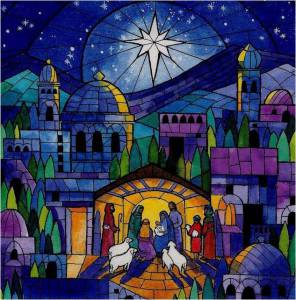A Devotion for The Eleventh Day of Christmas January 4, 2018
Read Matthew 1:1-17
“An account of the genealogy of Jesus the Messiah, the son of David, the son of Abraham.” Matthew 1:1
 The world Matthew lived in did not normally include women in the list of ancestors. Which is why the record of Jesus’s birth recorded in the gospel of Matthew is so important to us. It includes the names of five women, last of whom is Mary, mother of Jesus. Each suffered from prejudice in one form or another. Each woman included in the genealogy of Jesus has been a person on the outside. Through the words in the first chapter, Matthew tells us that the Savior came for people who are the least loved in the world. He does that by naming the skeletons in the closet of Jesus.
The world Matthew lived in did not normally include women in the list of ancestors. Which is why the record of Jesus’s birth recorded in the gospel of Matthew is so important to us. It includes the names of five women, last of whom is Mary, mother of Jesus. Each suffered from prejudice in one form or another. Each woman included in the genealogy of Jesus has been a person on the outside. Through the words in the first chapter, Matthew tells us that the Savior came for people who are the least loved in the world. He does that by naming the skeletons in the closet of Jesus.
Each of the women have compelling stories. Tamar’s story is found in the 38th chapter of the book of Genesis. Tamar is a young widow. In her world it was expected that when her husband died his brother would become her husband. The tradition insured that the line of the lost child would continue, as well as support his widow. Judah was Tamar’s father-in-law. When Tamar’s husband died, she married his brother. But, then that brother died. Judah was convinced that Tamar was jinxed. With the passing of years Tamar realized that Judah was never going to allow her to marry another of his sons. Yet, she cannot legally marry anyone else. One day, disguised as a temple prostitute of a pagan religion, she meets Judah on the road. He spends time with her and she becomes pregnant. Some months later Judah is outraged when he learns that Tamar is pregnant. He is ready to put her to death – until he discovers he is the father of her child. Among the ancestors of Jesus is the woman Tamar. Matthew is telling us that the Savior comes for people who have been unloved and unwanted.
The story of Rahab is told in the 2nd Chapter of Joshua. The Israelites are ready to move into the promised land. Rahab is a prostitute, forced into the trade by her economic circumstances. She offers to protect the scouts who stay at her home, as she comes to believe that their God is the one true God. Rahab is brought into the community of Israel. According to rabbinic tradition, she is one of the four most beautiful women in the world and remembered for her kindness and courage. Among the ancestors of Jesus is Rahab, mother of Boaz. Matthew tells us that the Savior comes for those who have not always been proud of the way they have lived their lives. The Savior comes to give fresh starts and new beginnings.
The Familiar story of Ruth told in the book of Ruth, is the third woman named by Matthew. She is from Moab, a land and people hated by the Israelites. After her husband’s death, Ruth insists on going to Bethlehem, the ancestral home of her mother-in-law Naomi. Soon the village of Bethlehem sees Ruth’s devotion to her mother-in-law. They see her kindness, loyalty, and goodness. In spite of her immigration status she wins the hearts of the people and the heart of Boaz. Matthew tells us that among the ancestresses of Jesus is a foreigner. The Savior comes for the immigrant, the alien, the foreigner – anyone who is an outcast in society. Matthew tells us that the Savior came for people who have not found acceptance elsewhere.
The Wife of Uriah is the last before Mary to be mentioned. We find her story in the 11th chapter of II Samuel. Her name is Bathsheba and her story could be on the front pages of our newspapers. A powerful man and King takes advantage of her. She is caught between love for her husband and being a subject of a king. Her husband is off on the field of battle when King David spots her one day. She is a beautiful woman and he wants her for himself. Not long after he sends for her, he discovers that Bathsheba is pregnant. David decides to cover the deed by sending Uriah into the front lines, knowing he is likely to be killed in battle. Uriah dies, then David takes Bathsheba for his wife, but their first child dies. Bathsheba experiences losses and tragedy. She is violated by a king. Her husband dies in battle. Her life is manipulated by David. Since her first encounter with David, her life becomes crisis after crisis, filled with loss and pain. Later she will give birth to Solomon. Bathsheba stands in the line of Jesus as a statement that Jesus the Savior comes for those who have been violated and used by others.
Most all of us have some kind of skeleton in our closets. Along with the ancestors and family stories we tell only in whispers, there are the deeds we are ashamed of. We remember moments when we lost our temper. There are words we would take back if we could and attitudes which have been destructive. We carry shame for things that have happened to us . . . ones we blame ourselves for. We keep our secrets tucked away. There are regrets and actions of an earlier day.
The promise of Christmas is, that the Savior comes for those who have reached their emotional and physical limits. The Savior comes for everyone who has felt forced by circumstances to compromise their deepest beliefs and values. The good news is that in Christ there is forgiveness for sins, a place for the outcast and acceptance for those who are living with shame. Most of all there is a love which frees us from our prisons of fear, of shame and of guilt.
Prayer: Loving Savior, You came to walk this journey with us. You came to free us from the hurt, pain, guilt and shame of yesterday. In this day, may we be willing to surrender our hurts, our pain, our guilt, our shame to you, trusting that in your love you will accept and love us even as we are. We give thanks for the message that each of us is loved and cherished by you. Amen.
Additional Advent & Christmastide Devotions can be found by clicking here: Advent & Christmastide Devotions
Share this:




